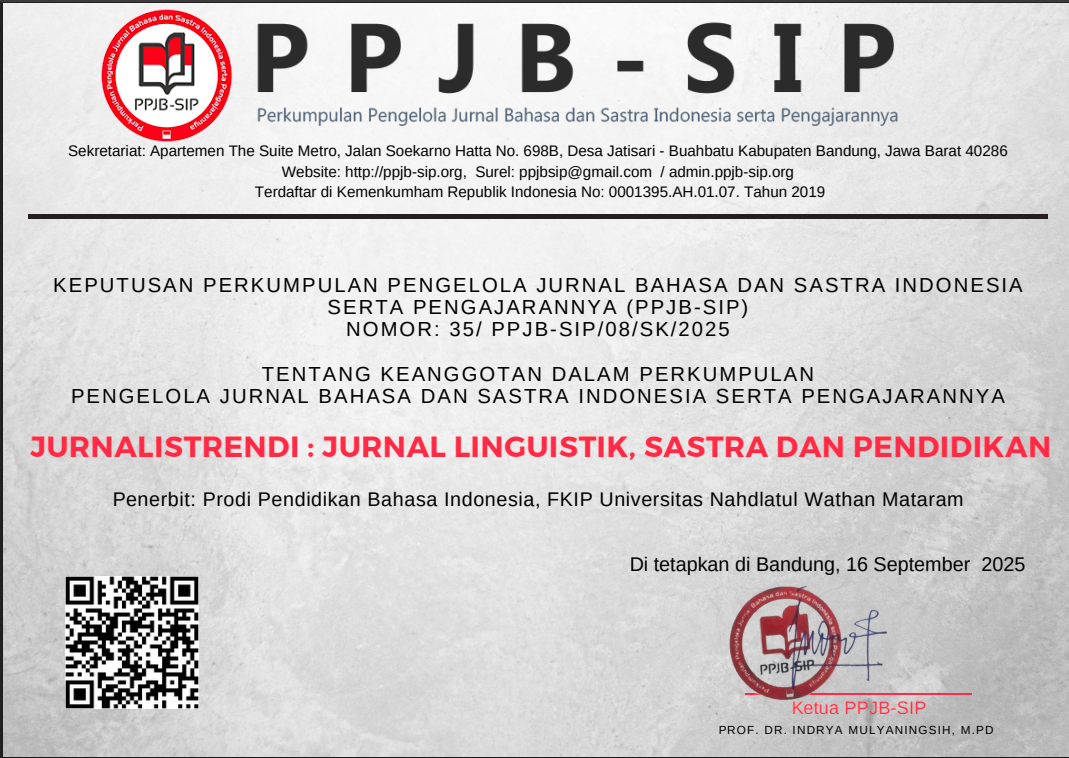Illocutionary Acts In The 2024 ABC News Presidential Debate Between Harris And Trump: A Pragmatic Study
Abstract
This research aims to analyze the use of illocutionary acts in the 2024 U.S. presidential debate between Kamala Harris and Donald Trump, focusing on how the candidates employ language strategically to influence public perception. Grounded in Searle’s (1979) speech act theory, which builds upon the foundational work of Austin (1962), the study investigates five categories of illocutionary acts: assertive, commissive, declarative, expressive, and directive. Using a qualitative descriptive method, data were collected from the official transcript of the debate and analyzed through categorization and contextual interpretation (Yule, 1996; Thomas, 1995). The results reveal that assertive acts dominate the discourse, reflecting the candidates' efforts to build credibility and assert policy achievements or critiques. Commissive acts were used to make promises and show future commitments, while directive acts served to challenge opponents. Expressive and declarative acts helped shape emotional connections and formal policy stances. These findings demonstrate how each candidate constructs political narratives through language use, reinforcing Mey’s (2001) view that pragmatics involves understanding meaning within sociopolitical interaction. The study offers insights into the persuasive power of language in political communication and contributes to the broader field of pragmatic analysis. By synthesizing these frameworks, this study underscores the role of speech acts in crafting political narratives, shaping public perception, and advancing political communication research.
Kata Kunci: illocutionary acts, assertive, commissive, declarative, expressive, directive
Downloads
References
Agustina, E., Farhan, M., & Simatupang, E. C. M. (2020). Strategic communication in political discourse: A pragmatic perspective. Journal of Political Linguistics, 15(2), 112–130.
Agustina, T., & Wibowo, P. (2021). The use of directive acts in political discourse: Case studies in Southeast Asia. Journal of Language Studies, 19(5), 345–367.
Austin, J. L. (1962). How to do things with words. Oxford: Clarendon Press.
Farhan, M. (2020). Rhetorical devices in political campaigns: A pragmatic analysis. Discourse Studies Journal, 9(4), 321–338.
Ibrahim, A. (2020). Illocutionary acts in political speeches: A case study of presidential debates. Journal of Language and Communication Studies, 18(1), 45–62.
Khodijah, I. (2020). Pragmatic dimensions in political debates: A comparative study. Journal of Pragmatics and Discourse Analysis, 11(3), 231–245.
Lestari, N. (2020). Persuasive strategies in presidential campaigns: A pragmatic approach. Journal of Sociolinguistics, 13(1), 67–89.
Mey, J. L. (2001). Pragmatics: An introduction (2nd ed.). Oxford: Blackwell.
Najib, R., & Zulkifli, H. (2019). Assertive speech acts in political campaigns: A study on Malaysian politicians. Asian Journal of Political Communication, 7(2), 45–60.
Rachman, R. (2020). The role of promises in political persuasion. Pragmatics and Society, 12(3), 210–226.
Rahayu, S. (2021). Emotional appeal in expressive speech acts: A case study of election campaigns. Discourse Analysis Journal, 14(3), 289–310.
Searle, J. R. (1979). Expression and meaning: Studies in the theory of speech acts. Cambridge University Press.
Simatupang, E. C. M. (2022). Empathy and critique in political speech acts: A comparative analysis. Journal of Linguistic Studies, 20(4), 98–115.
Thomas, J. (1995). Meaning in interaction: An introduction to pragmatics. London: Longman.
Yule, G. (1996). Pragmatics. Oxford University Press.
Copyright (c) 2025 JURNALISTRENDi : JURNAL LINGUISTIK, SASTRA, DAN PENDIDIKAN

This work is licensed under a Creative Commons Attribution-NonCommercial 4.0 International License.

.jpg)




